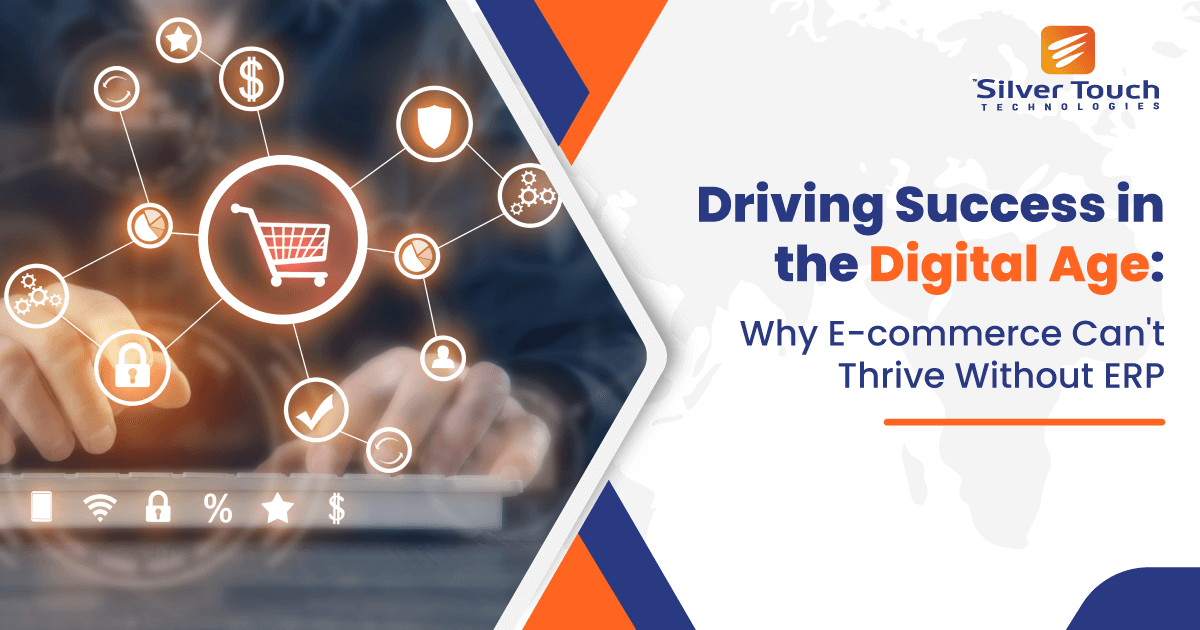ERP for Ecommerce Business – An Overview
The transaction between E-commerce companies and their customers happen entirely online. However, all the other processes in such companies are similar to those in offline retail companies. There are the aspects of supply chain, warehouse, accounting and so on. This means that all the traditional process-related challenges faced by a brick-and-mortar retail company are also faced by e-commerce companies as well. And in addition to that, these companies need to synchronise their processes with online sales and marketing. It’s clear that modern e-commerce companies have a lot on their plate. They need an ERP system that can beautifully synchronise offline processes with online sales and marketing transactions. They need an ERP system that’s made for Ecommerce companies.
E-commerce Companies Need Specialised ERP To Streamline Online Processes
The ‘Why’ of ERP For E-commerce
The business model of an e-commerce company brings with it many process-related challenges. These challenges are quite different from the ones faced by offline retail stores. So to understand what exactly an ERP for e-commerce is and why e-commerce needs it, you first need to know about the unique challenges e-commerce companies face.
Challenge 1: Customer Loyalty
Unlike offline retail stores, where there is a personal bonding between the people managing the store and the customers who shop there, e-commerce websites don’t have this element of bonding. This, in turn, makes it harder for e-commerce companies to nurture customer loyalty. Giving discounts isn’t a very sustainable business strategy, nor is providing free delivery for a lifetime. So, how can an ERP solve this issue? We will learn about it below.
Challenge 2: Changing Market Dynamics
When it comes to the online market, rapid changes in market dynamics can take you by surprise. For example, it has been observed that people in the UK now start their online shopping journey during the day but press the buy button at night – after careful research. This means that online shopping isn’t associated with impulse buying anymore.
How can e-commerce companies identify and leverage such emerging trends with the help of ERP software? We will find out soon.
Challenge 3: Inventory Issues
All the inventory issues faced by traditional businesses are there in the e-commerce world as well. These issues come with more complexities thanks to the online nature of the business. For example, an e-commerce business needs to have some kind of mechanism so that the inventory levels get updated on a real-time basis just after a customer places an order. Again, if the inventory levels aren’t updated accurately, and a stock-out situation arises, customers won’t be waiting for your inventory to be replenished.
Challenge 4: Data Silos
An e-commerce company can experience terrible data silos if the process is not handled properly. For example, an e-commerce website needs to have a clear picture of the journey of a product from the inventory to distribution centres and to the customer. Without real-time information about the item’s whereabouts, the company can’t provide tracking services to its customers. If any delay happens during the delivery window, the company won’t get real-time info about that delay. The result – the growing impatience of the customer.
Challenge 6: Low Cart Value
Low cart value is a big issue in the e-commerce world. Every e-commerce company has a free delivery tier for customers who buy products worth more than a specific value. However, as customers keep buying the bare minimum number of products to qualify for free delivery, the delivery expenses eat away at the revenues- not to mention the probability of returning delivered items. So how can ERPs increase the cart value?
Challenge 5: The Problem With ERP Itself
Most ERPs are made keeping traditional business processes in mind. These ERPs can’t solve the unique challenges faced by e-commerce companies. As a result, despite the need for an e-commerce ERP, these companies are forced to tweak traditional ERP software, adding integrations upon integrations to make those ERPs work for them. Is there any ERP available that can work for e-commerce companies out of the box? We will find out… So based on these unique challenges faced by e-commerce companies, it’s clear that by e-commerce ERP we mean software that can stitch together all the company processes and act as the single source of data for all the departments. It should be flexible enough for e-commerce companies to keep pace with the changing business scenario.
You May Also Like to Read: ERP for the Wholesale Distribution: A Comprehensive Guide
Reasons Why Ecommerce Companies Should Use ERP to Address the Issues:
An e-commerce company can use separate systems to manage separate aspects of its business. However, it will be really cumbersome to make these separate systems work in a synchronised way.
An ERP, on the other hand, can play the role of all these disparate process management software. This means that each of the processes of an e-commerce company remains tightly integrated, ensuring cohesion.
Here is the reason why an e-commerce business needs an ERP-
Fostering Customer Loyalty
As we mentioned earlier, one of the biggest challenges an e-commerce company faces is the lack of customer loyalty. Modules in ERP software can be leveraged to establish a meaningful relationship with customers, thereby increasing customer loyalty.
Remember, an ERP system has all the data about the customer of the e-commerce company. This data can be leveraged to understand customers in a better way. Consider this scenario-
Scenario 1
John goes to an e-commerce website to buy a watch that’s selling at a discount. He already has an account with the website. To his surprise, while checking out, John is offered an additional discount of 10% because it’s his birthday.
Now ask yourself, won’t John want to use the same website while shopping for watches? Of course, he will.
So how does this work?
The e-commerce company’s ERP has a CRM module with the birthday data for all the customers. The online payment page remains connected with this data. And if the customer intending to buy a product has their birthday, they receive an additional discount.
Look at this second scenario:
Scenario 2:
Emily purchased a product from an e-commerce marketplace. The product will be shipped from a different city. However, during the picking and packing process, the item is left behind. However, thanks to modern ERP systems that rely on barcode or RFID-based verification, the ERP identifies that one product item associated with an open order has not been picked. This proactive monitoring by ERP software enables eCommerce companies to avoid shipping delays.
The result? Emily receives her product on time. A customer who gets her product on time is a happy customer. And a happy customer is a loyal customer.
Want to Increase Revenue for Your Ecommerce Business?

Smart ERP Systems Help eCommerce Companies Navigate Changing Business Dynamics
ERP software enables eCommerce companies to organise their enterprise data. Their entire enterprise data resides in the ERP, which acts as a single source of truth. Now, since the ERP has access to the entire eCommerce data, it can leverage it and come up with interesting insights. For example, based on the sales and inventory data, an eCommerce ERP software can identify which products are gradually losing popularity and which products are gaining steam.
From a customer point of view as well, data from the CRM module enables you to see which customer is gradually decreasing the frequency of buying products from you. This will enable your marketing team to formulate special campaigns for this set of customers. Data generated by the purchasing module can provide similar insights into the vendors’ behaviour.
ERPs for eCommerce Synchronise The Inventory With The Online Platform
An eCommerce seller can sell via multiple online channels. It can even have a mixture of online and offline sales channels. Either of these two setups can turn out to be extremely difficult to manage if the inventory is not in sync with all the channels.
Suppose a company sells its products on Amazon as well as its own online store. What will it do? Will it use separate inventories for separate platforms? Won’t that be cumbersome? This is where ERP comes in. An ERP system can help you use the same inventory for multiple sales channels. But don’t worry. You have 100% flexibility. You can leverage bin locations to use one warehouse and maintain multiple inventories of the same product in the same warehouse.
ERPs Provide a Single Source Truth
Every functionality we just mentioned above is possible only because ERP systems for eCommerce have the ability to gather entire enterprise data and provide a single source of truth.
- The inventory is connected to the online platform. Hence the number of available to-buy products remains updated.
- The purchasing team gets real-time inventory data as well. Hence they know when it’s time to place a purchase order. In fact, modern ERPs alert you when the inventory of a certain product falls below a predetermined level.
- The accounting module is connected with sales and purchases enabling automated updation of ledgers and accounts.
- The marketing department is connected with the CRM module enabling them to automate, log and streamline marketing campaigns.
- This is just a list of four ways how an ERP for eCommerce keeps enterprise data tightly integrated. There are many such instances.
Smart Insights Enable eCommerce Businesses To Increase Their Customer Cart Value
Modern ERP system is always ready to provide purchase history and product search history for all customers. An e-commerce platform can leverage this insight to display those products that customers are more likely to buy. Furthermore, insights from ERP can help eCommerce companies display the most products to upsell that customers are most likely to accept.
eCommerce Companies Need ERPs That Suit Their Unique Needs
An eCommerce company won’t find a generic ERP suitable for the management of its day-to-day operation. The best ERP for eCommerce business must have the functionalities that we discussed above. Companies should be able to integrate all the major eCommerce platforms with the ERP. This is why Amazon uses SAP because of SAP’s inherent capability of fitting into the eCommerce process. On top of that, SAP ERP versions support all the important integrations and add-ons demanded by eCommerce companies.
Implementing ERP for eCommerce Businesses: The Best Practices
As with any ERP implementation, implementing eCommerce ERP should follow a rigorous process with all the best practices being followed by the ERP implementation partner.
It is a known fact that around 60% to 70% of ERP implementations fail because of improper installation. It will be damaging for an eCommerce company if that happens. Hence, these best practices must be followed –
- Before the implementation, there should be a thorough requirement analysis. Which platform does the eCommerce business use? What kind of products does it sell? Is it a service-based business or a product-based business? What is the budget? All these important questions must be answered.
- Have a clear idea about the objective. Yes, we all can say that every ERP implementation happens with the objective of streamlining the processes. But it is necessary to understand what problems the company aim to solve with an eCommerce ERP.
- Based on the above two points, the ERP vendor and the customer should now figure out which ERP software will be the best fit for them.
- Another important aspect that needs to be kept in mind is how tech-savvy the internal IT team of the eCommerce company. The choice of ERP will vary depending on the tech expertise of the in-house IT team of the company.
- Remember, an ERP is not just a technical investment. It will impact every aspect of the business. Hence, the ERP vendor must consult with cross-functional business teams in the eCommerce company.
- Lastly, since an ERP will permanently change the business process of an eCommerce company, it is necessary for an ERP vendor to provide consistent after-sales support so that the eCommerce company does not feel lost.
Future Trends In eCommerce ERP
Since eCommerce is a rapidly changing business model, future trends will obviously impact the future versions of eCommerce ERP. Here are some future trends that can be observed –
- Integration of generative AI with ERP to provide automated and best-in-class chat support, recommendation and analytics.
- We are seeing an influx of social media add-ons for eCommerce ERPs. This means that in the future, we will see modules supporting social media marketing being offered out of the box with the ERP.
- We are also seeing an uptick in the integration of IoT tools with eCommerce to enhance the functionalities of robotic processes being used in fulfilment centres.
Work Smart, Not Hard With eCommerce ERP
The eCommerce business is highly competitive. We can’t be reactive; we have to be proactive. And this is only possible once we have clear visibility of the processes and enterprise. And the best way to have visibility is by using ERP software.
However, not all ERPs are made for eCommerce. A lot of ERPs fall short when it comes to meeting the specific demands of eCommerce businesses. This is where SAP S/4 HANA and SAP Business ByDesign come in. Armed with decades of experience in the ERP industry, SAP Business One ERP suites are eCommerce-ready. In fact, SAP has its own eCommerce platform – SAP Commerce Cloud that gels impressively with other SAP products enabling businesses to move, innovate and stay ahead of the competition. SAP ERPs can also be smoothly integrated with Shopify, Amazon and other major eCommerce platforms.
When it comes to eCommerce ERP, you need stability and compatibility. SAP provides both of them. That’s why it’s considered the best ERP for eCommerce.
Want an ERP System for your eCommerce Business?
Contact Silver Touch Technologies For an Error-Free eCommerce ERP Installation
Do you feel like you are losing control while managing your eCommerce business? Then that’s the hint that you need an eCommerce ERP.
But remember, haste makes waste. Implementing an ERP is a big decision with far-reaching consequences that can make or break your business.
This is choosing the right ERP implementation partner that can understand your business processes; your objectives are of utmost importance.
Contact Silver Touch Technologies for an error-free ERP implementation experience. Stand on the shoulders of our technical and functional ERP implementation experts. Get an ERP that works as you want it to.





